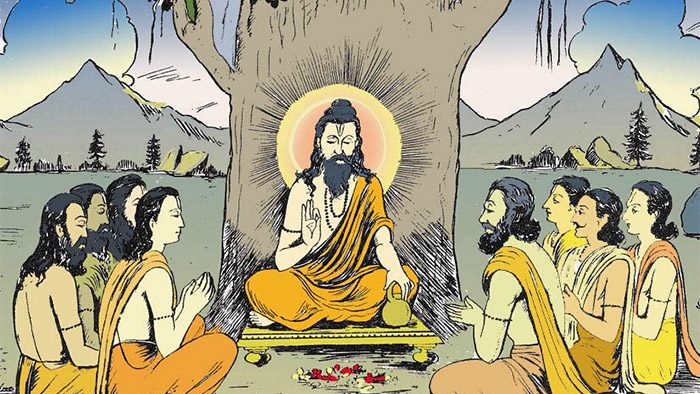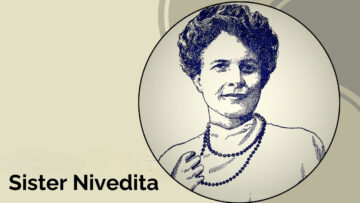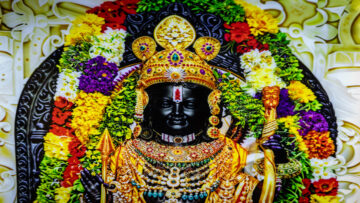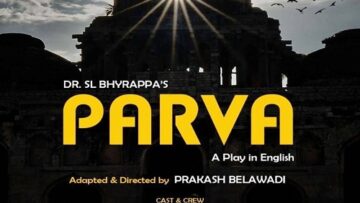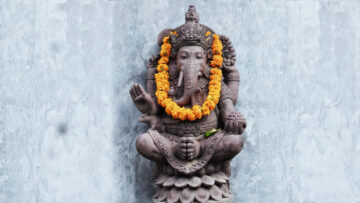The story of Veetahavya is a very small story, unassumingly tucked in a corner of Anushasana Parva. It is easy to miss the story altogether. A careful reading reveals an intriguing story profoundly narrated. Certainly in perspective and arguably in history, its importance is immense. The event this story represented arguably added an important dimension to our Tradition and Civilization. It is in the nature of competing entities in the society to get into conflicts, often very tragic. They lead to different ends and outcomes. This one led to an outcome that we must keep at the back of our minds for eternal guidance and reflection.
King Veetahavya belonged to the Haihaya-Yadava dynasty. In the most ancient of the times, Rajarshi Manu ruled the earth with righteousness and concern. He had a son by the name Sharyati. In his lineage was born the King Vatsa who had two children – Haihaya and Taalajangha. Haihaya was also called Veetahavya. He had ten wives. Each of them was blessed with one hundred children. Thus, Veetahavya was rich with a thousand children. Veetahavya’s children were extraordinary in every sense of the word. They were deeply learned in the Vedas and Shastras. At the same time, they were ruthless wielders of the weapon. They were strong, indulged in expeditions with unmatched passion. In summary, they were accomplished in many Shastras and the Dhanurveda alike.
At the same time, the Kingdom of Kashi was graced by the Kingship of Haryashva. His fame ran far and wide too, as the greatest among the victorious. The two kingdoms were destined to clash. Veetahavya’s sons once went on a war with the venerable Haryashva. A terrible war was fought in the riverine regions of Ganga-Yamuna. It proved to be disastrous for King Haryashva. He was comprehensively defeated and killed. Veetahavya’s sons returned to their capital victorious.
The Kingdom of Kashi indeed mourned the loss of its King. But it was blessed with righteous Kshatriyas. Haryashva’s son Sudeva was equally learned, righteous and just. He was soon crowned as the King and graced the state with his kingship just as his father did in all aspects. Soon, he came to be known as a righteous King of the lineage. But Veetahavya’s sons were not done with their indulgence in passion. The events of the cycle completely repeated. They came with their ferocious attack. King Sudeva had to face them. Veetahavya’s sons comprehensively defeated Sudeva, killed him and returned to their kingdom. As they savoured their victory, the Kingdom of Kashi was orphaned without a King, once again.
The ministers of Kashi elevated Sudeva’s son, the venerable Divodasa, as the King of Kashi. Every single person in Kashi was now concerned of yet another attack from Veetahavya’s sons. Divodasa himself was no less conscious of it. Divodasa knew that Veetahavya’s sons were greatly disciplined with immense control over their senses. He needed no reminder of their valour. The terrible fate of his father and grandfather had taught him, and the kingdom, an unforgettable lesson. He built a new city called Varanasi, fortified to make any external attack impossible. The city was full of all kinds of riches and people of all walks of life. With Ganga at one end and Gomati at the other, the city was rich in business, material, people and activities. Secure in this set up, Divodasa graced the state with his righteous kingship. But this was not to last long.
In yet another repetition of events, Veetahavya’s sons attacked Divodasa again. The mentally prepared Divodasa bravely faced Veetahavya’s sons in a war that matched the ferocity and enormity of the Deva-Danava battles. It ran for a hundred days in which Divodasa lost much of the army and people. Worse, his treasury came to a near end. The situation came to such a state that Divodasa had to abandon the battle and the very kingdom and flee. A defeated, distraught, desperate and forlorn Divodasa decided to meet the Sage Bharadvaja in his Ashrama. Bharadvaja was his family priest – the kula purOhita.
Sage Bharadvaja, belonging to the great clan of Sage Brihaspati, assured him of all his help. “Oh great King! Why have you come here in such a haste leaving away all your important royal affairs? What do you need from me? Rest be assured – I shall do that which pleases you. I shall not question any further on what you desire from me. Speak freely and without fear.” Divodasa said, “Oh Sage of immense greatness, there is a terrible war between my lineage and the Haihayas for many generations. We have been losing successive battles. Veetahavya’s sons have killed my entire lineage. I too have lost everything in the battle. Here, I stand in front of you all alone, the only person of my lineage left alive – a small mercy from Veetahavya’s sons. I have come to you seeing your protection and grace for me to get all that I have lost back. I surrender to you as your shishya. Please protect me and nurture me as your Shishya.”
“You are not to worry any more, good King” said Bharadvaja. “I shall perform a yagna to fulfill your desires. As a result, you will receive a son who will destroy Veetahavya’s sons, all of the thousand.” So saying, Bharadvaja performed the divine Putrakameshti Yagna for King Divodasa, in the full glory of rituals. Very soon, by the grace of the yagna, Divodasa was blessed with a son, who he named Pratardana. As soon as he was born, Pratardana grew to be a 13 year old boy. He had already studied all the Vedas in discipline of an adhyayana. Like an exemplary Kshatriya, he was proficient in the Dhanurveda. He could elevate the warfare to its greatest level of righteous performance. In addition, Bharadvaja presented his own divine powers of Yoga to Pratardana.
Pratardana was a matter of great pride for Divodasa. He was honoured as a Deva even by the Devarshis. After being crowned as the Yuvaraja, he directly set out for a deciding battle with Veetahavya. Divodasa was rejoiced to see the glory of his son leading the army with his mighty weapons. In his mind, he saw the end of his enemy and his sons. Divodasa crossed river Ganga and set himself towards the capital of Veetahavya. A great battle ensued between the two. Veetahavya’s sons, basking in the glory of their victories and strength, met Pratardana and showered their weapons on him. Pratardana, though, had an answer for every display of their strength. Their shastras were met with shastras and astras with astras. Pratardana neutralized every single weapon of theirs. He showered his deadly weapons to completely destroy Veetahavya’s sons. He cut their bodies into pieces that spread all over the battlefield, like the leaves of a tree.
Veetahavya was in a stun. His sons had never tasted a defeat. Never had he lost them in a battle and here he had all of them dying a gory death at the hands of a single warrior. Veetahavya was enveloped with both grief and fear. He abandoned his capital, ran to the Ashrama of Bhrigu Maharshi and surrendered to him. Maharshi Bhrigu assured him of his grace and asked him to be fearless. Soon, Pratardana, who was following Veetahavya with vengeance, reached the Ashrama. He spoke in a loud voice “I bow to the sages and elders of the Ashrama. Are there shishyas of the venerable Bhrigu in the Ashrama? I, Prince Pratardana, would like to meet the great Sage Bhrigu. Please convey my respects and seek his permission”. Learning of Pratardana’s arrival, Sage Bhrigu decided to meet him himself and came out of the Ashrama. Pratardana was honoured by the sage as a Royal Prince and invited to the Ashrama. “Oh Pratardna, you are a prince shining like the very Indra himself. How can I be of help to you? Please tell me at once”. Pratardana was in a hurry. “Oh great among the Brahmanas, Veetahavya has entered your Ashrama. Please send him out. His sons have destroyed my ancestors. Why only my ancestors, they have destroyed our Kingdom of Kashi itself. They have looted our treasury. Veetahavya was beaming in the glory of the cruel victories of his children. I have destroyed them in a battle already, they have met their deserving end. I just seek to eliminate Veetahavya from the surface of the earth. I shall then be free from the burden of the destruction of my ancestors and the pain that my father went through.”
Sage Bhrigu smiled. In his mind, he decided a few things and categorically said “Oh the great Pratardana, in my Ashrama there is no Kshatriya at all. Every single person here is a Brahmana”. Pratardana was taken aback. Bhrigu’s words and his firm but gentle voice fell on his ears and rang like a bell. He remained silent for a while. His anger receded gradually. He got up and went to Bhrigu in slow steps filled with devotion. He touched his feet and said “Oh great Rishi, if there is no Kshatriya at all in your Ashrama that is music to my ears. I have done the most unachievable. My acts have achieved their highest fruits. I have no doubts about it at all. Through my valour, I have made Veetahavya abandon his very Kshatra. Oh Brahmarshi Bhrigu – I take your leave kindly with your kind permission. Please grace me with your blessings so that there is always good ahead of me. Oh sage Bhrigu – I have made Veetahavya abandon his Kshatra and that is the truth”. Thus Pratardana went away from the Ashrama, never to return. He no longer sought revenge against Veetahavya. His mind was now void of the poison of vengeance.
Bhrigu’s words had its effect. The moment he said that all in his Ashrama were Brahmanas Veetahavya became a Sage. His Kshtra vanished. His fame as a great Brahmarshi went far and wide. He soon had a son named Ghritsamada, who was equal to Devendra in his charm and appearance. Daityas once confused him for the very Devendra and abducted him. The great Brahmarshi Ghritsamada received a son Suchetas. His son was Varchas and grandson Vihavya. Vihavya received a son named Vitatya. Satya was Vitatya’s son and his son was Santa. Santa’s son Shravasa and grandson Tamas. He had a son named Prakasha who became famous as a great Brahmana. Prakasha’s son Vaageendra, whose son was Pramati. Pramati was a great sage known for his knowledge of Veda and Vedanga. He received a son by name Ruru from the Apsara Ghritachi. Ruru married Pramadvara. Their son was the great Shunaka whose son was the venerable Shounaka.
Thus the great king Veetahavya became a Brahmarshi by the grace of Sage Bhrigu, abandoning his Kshatra.
This is an intriguing and troubling story. On the one hand, we have Veetahavya and his sons. They are learned in Vedas and the Shastras, extraordinarily disciplined, definitely Tapasvi-s. Tradition allows the display of valour and battlefield indulgence for Kshastriya-s. But then a great Kshatriya’s purpose is not to win battles. It is to establish Dharma and indulge in a righteous rule, after acquiring Kingdoms. However, Veetahavya’s sons have no interest in the Kingdom of Kashi. They are merely interested in a continuous humiliation of the Haryashva’s lineage. They seek an unrestricted indulgence in battles arising out of their prowess. Their desire (Kama) for a battlefield victory cry has far overtaken their sense of establishing Dharma and seek Moksha. In them, the Vedic perspective of the Purushartha has weakened.
It is to Divodasa’s credit that he seeks the support of divinity through a Sage belonging to the Angirasa clan. It requires a Sage practising the essence of Vedas, in the right method and perspective, to shape a Kshatriya who leads the transformation. It needs a Kshatriya who neither lost valour nor perspective in the midst of an intense conflict. Pratardana has the full valour of a Kshatriya, just as Arjuna did many years later. His very attack on Veetahavya was such that Veetahavya lost all Kshatra that blinded him from the perspective of his ancients. But it went a step further. Veetahavya seeks the protection of an enterprising Sage, who could transform the Kshatra rage and experience into seeking Brahma. Our intense experiences can catapult us into greater orbits in the presence of extraordinary beings. Sage Bhrigu’s mere words could create a new world and reshape a person. It is a result of Veetahavya’s experience, a deep element within him, the nature of Pratardana’s attack and the divine presence of Sage Bhrigu.
This transformation is a triangular one. Pratardana and Veetahavya are both subjects and objects in this Yagna. Pratardana is full of vengeance and hatred for Veetahavya seeking revenge. It is righteous in every way as he has lost many ancestors. His kingdom is in a dilapidated condition due to mindless assault by Veetahavya. His wish to exterminate the Haihayas can be sympathized with. Yet, in that moment when Bhrigu declares the absence of any Kshatriya in the Ashrama, Pratardana thinks beyond. He recognizes that he had killed the Kshatra in Veetahavya. A Kshatriya’s aim is to establish Dharma. If Veetahavya had to abandon his Kshatriya altogether then it is the same as exterminating the King Veetahavya. If because of this Veetahavya becomes a Brahmana, it is glory to Pratardana. Pratardana thought of a far bigger success than spilling the blood of Veetahavya. The real vengeance is to eliminate the Kshatra in him. When that is not an option, a brutal killing is the only way. This transformation is not easily achievable. It requires the presence of a Bhrigu. It cannot be simply wished and realized. It is not about granting an easy mercy. It also needs Veetahavya to be truly ready for it, which in turn requires the enterprising presence of a Bhrigu.
Thus, the civilization of Bharatamandala nurtured many beautiful flowers in its Purushartha tree. In its quest to live the essence of Purushartha, it explored every way of realizing it. In its exploration, every time it encountered a slippery slope, it marked the path for us to walk with care. Where they found an opportunity for transformation, they left a gem glowing infinitely. It is for us to pick them up and repurpose them for future generations.
Disclaimer: The opinions expressed in this article belong to the author. Indic Today is neither responsible nor liable for the accuracy, completeness, suitability, or validity of any information in the article.

